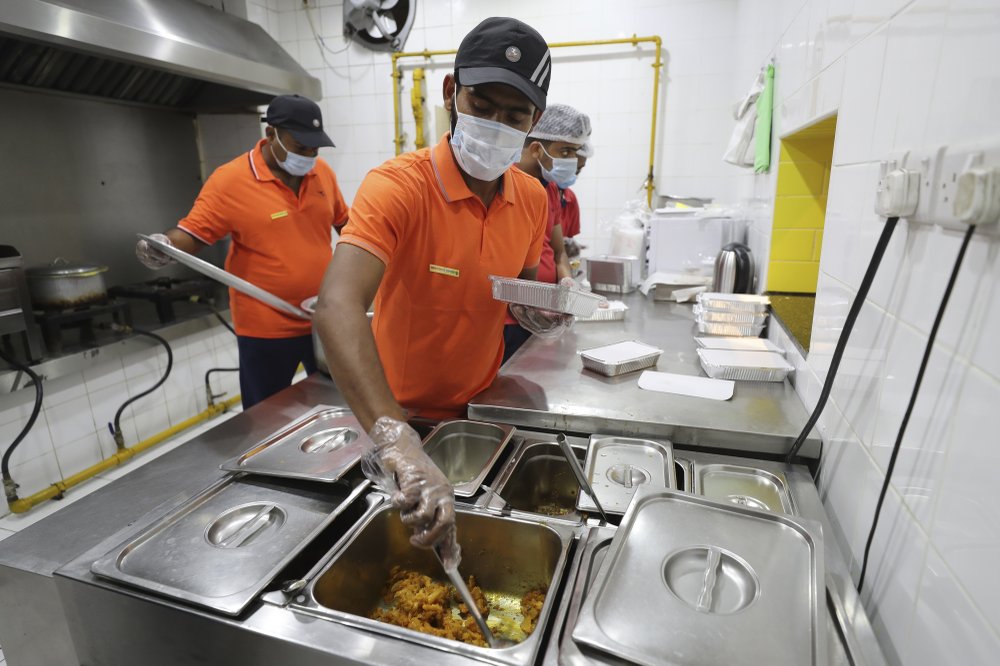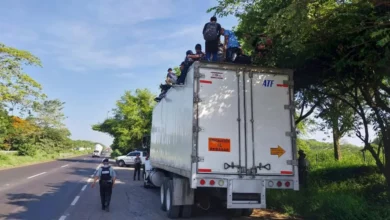
SHARJAH, United Arab Emirates (AP) — At a highway-side restaurant in the industrial outskirts of Dubai, workers methodically assemble packaged takeout meals of biryani rice, dal and brightly colored chicken curry for people in poverty and desperate to eat.
It’s not a soup kitchen or charity drive, but an ordinary hole-in-the-wall Indian restaurant alongside a busy motorway in Sharjah, one of the seven desert sheikhdoms in the United Arab Emirates.
When other kitchens close for the night, Biryani Spot springs into action. The cooks collect leftover food and repurpose it into free, hot meals for underpaid or out-of-work migrants, largely from Southeast Asia. Those in need filter through the cramped restaurant at 10 pm to receive dinner — no questions asked.
“The current situation is you have a lot of jobless people, a lot of people who are struggling here because of their low salary,” restaurant co-founder Mohammed Shujath Ali said. “We don’t want to waste our food, … we want to give it to people in need.”
As small businesses across the UAE shut down this spring due to the coronavirus pandemic, Ali and his wife were getting ready to open up theirs. A former mechanical engineer, Ali long dreamed of running his own restaurant, a place where the migrant workers who power the plastic and fabric factories of Sharjah’s dusty Industrial Area 13 could savor familiar Indian, Pakistani and Bengali food at an exceptionally inexpensive price.
Instead of thwarting his plans, the pandemic-induced economic collapse created an opportunity. Tens of thousands of people working in the shadows of Dubai’s economy lost their jobs overnight, as hotels, restaurants and families fired their low-wage service workers in response to the lockdown.
Unable to draw on state support in a country that links their residency status to their jobs, many turned to charity to survive.
Over its two months of existence, Biryani Spot has mobilized to meet the area’s growing need for food aid. The place serves griddled paratha bread and a range of spiced meat and rice dishes for less than five dirhams (around $1.50) during the day, and for nothing late at night.
Those cheap or free meals go a long way in the UAE, a nation of some 9 million people with only about 1 million Emiratis. Southeast Asian laborers, taxi drivers, cleaners, cooks and office workers power businesses across the emirates, home to skyscraper-studded Dubai and oil-rich Abu Dhabi. While many have returned home during the pandemic, others remained, hoping to find work to support loved ones back home.
Taj al-Islam, a 50-year-old Bangladeshi carwash worker, long has struggled to make ends meet, earning about $270 a month, barely enough to feed his five children back home. He said the free takeout helps him stretch his budget a little longer.
Mohammed Shakeel, a 38-year-old from Pakistan, arrived at night’s end to take the remaining meals back to his mosque about 25 kilometers (about 15 miles) away in Dubai. After 19 years as a service manager at a luxury car dealership, he was fired in March when the virus struck. Now he fruitlessly knocks on company doors in search of work, feeling tired and lightheaded without food.
“In any other country I’d be supported if I lost a job like this, but here there’s no help,” Shakeel said as he piled up the food parcels.
So far, Biryani Spot’s biggest challenge is getting the word out. The sprawling neighborhood doesn’t have much foot traffic. Hidden from the street, the restaurant’s small yellow sign is easily missed among rows of ramshackle shops and abandoned buildings.
Ali promotes the free food through regular posts in Facebook groups for residents. When people don’t turn up, he packs dozens of meals and drives them directly to denser areas, taxi stands or offices where he knows cleaners on their night shifts go hungry.
He described the handouts as a “small contribution” to people in need, something that’s built into his faith as a Muslim.
“We are just a small-scale business, doing our job, like every human does in his own way,” Ali said.
___




